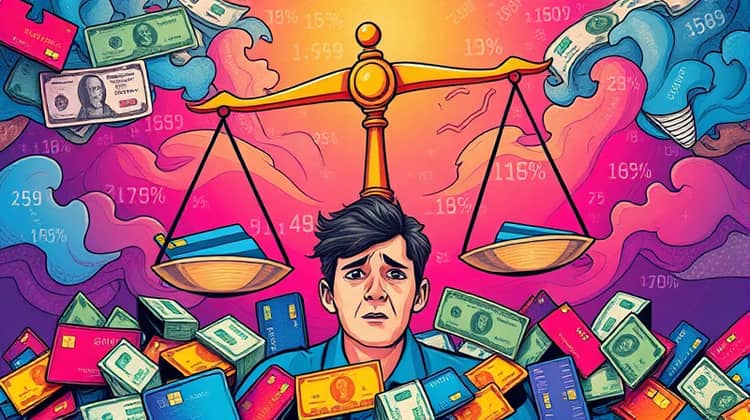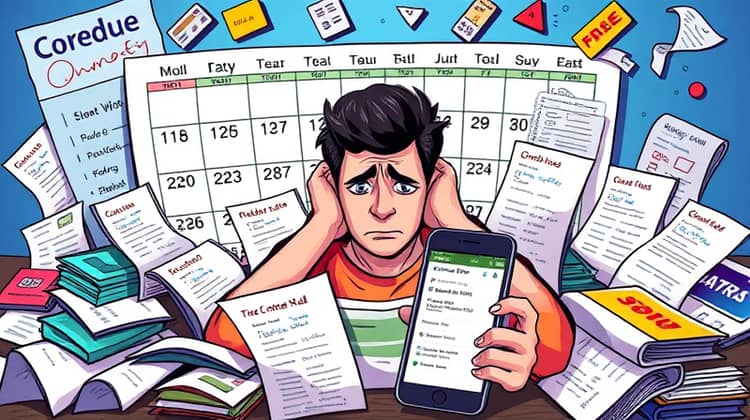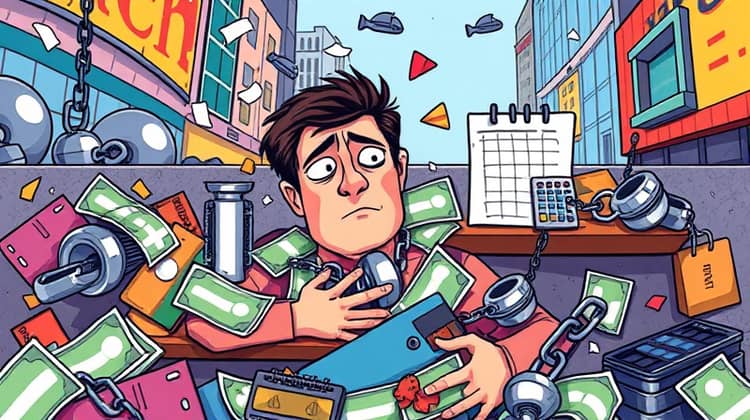Managing your credit cards wisely is essential for maintaining good financial health. With the rising popularity of credit cards, many consumers fall into common traps that can harm their credit scores and overall financial stability. This article outlines the top mistakes to avoid when using credit cards, ensuring you navigate your financial journey with confidence.
By steering clear of these pitfalls, you can unlock the full potential of your credit cards, leveraging their benefits while minimizing risks. Whether you're a seasoned credit card user or new to the credit landscape, understanding these mistakes can strengthen your financial foundation and empower you to make informed decisions.
From carrying a balance to ignoring rewards programs, the following sections delve into the specific missteps that can affect your creditworthiness and financial health. Let's explore these mistakes in detail and learn how to avoid them effectively.
1. Carrying a Balance

One of the most common mistakes consumers make with credit cards is carrying a balance from month to month. Many believe that this is acceptable as long as they make minimum payments. However, this habit can lead to exorbitant interest charges over time, making it difficult to pay off the debt and trapping users in a cycle of financial instability.
When you carry a balance, you're likely paying interest on that amount, which can accumulate quickly. Credit card debts can spiral out of control without proper management, ultimately impacting your credit score negatively. Consumers are often unaware of how high-interest rates can turn a small debt into a significant financial burden.
- Paying only the minimum amount due each month
- Allowing interest to accumulate without attempting to pay down the principal
- Failing to create a budget to manage credit card spending
To avoid this mistake, aim to pay off your balance in full each month, preventing interest from building up and promoting healthier financial habits.
2. Missing Payments

Missing credit card payments is another critical error that can severely damage your credit score. Payment history is one of the most significant factors that contribute to your overall credit score, and any missed payments can remain on your credit report for up to seven years.
Late payments can also incur hefty fees and increase your interest rate, leading to higher overall costs. Establishing a reliable payment schedule is essential to keep your credit in good standing and maintain financial health.
- Setting reminders for payment dates
- Prioritizing credit card payments in your budget
- Considering automatic payments to ensure timely payments
By being proactive about your payment schedule, you can avoid the pitfalls associated with late or missed payments and safeguard your credit score.
3. Not Knowing Your Interest Rate

Many credit card users do not fully understand their interest rates and how they are applied to their balances. This lack of knowledge can result in unexpected charges and difficulty managing debts. Without awareness of your card's interest rate, you may find yourself accumulating debt faster than anticipated.
It is crucial to learn whether your credit card carries a fixed or variable interest rate, as this will impact the overall cost of your borrowing. Ignorance about these rates can have long-term implications for your financial health.
Additionally, consumers must compare interest rates among different credit cards, especially when applying for new cards. A higher interest rate can quickly erode the benefits of rewards or perks that a card may offer.
4. Ignoring Your Credit Limit

A common error is exceeding your credit limit, whether unintentionally or without a clear understanding of how it affects your credit utilization ratio. Credit utilization, or the amount of credit you are using compared to your total available credit, plays a significant role in determining your credit score.
By ignoring your credit limit, you risk incurring over-limit fees or having transactions declined. Keeping a close eye on your limit fosters better spending practices and helps avoid unnecessary complications.
- Monitoring your spending to stay within your limit
- Requesting a credit limit increase when appropriate
- Being aware of how your limit affects your credit utilization
By respecting your credit limit, you maintain control over your credit health and reduce the risk of penalties associated with overspending.
5. Closing Old Credit Cards

Some consumers believe that closing old credit cards can improve their credit scores by removing potential debt sources. However, this strategy could backfire, as closing old accounts can negatively impact your credit history and lower your overall credit score. Credit age is a factor in credit scoring, and older accounts contribute positively.
Another factor to consider is that closing a credit card can increase your credit utilization ratio if the total credit limit decreases. This could further harm your credit utilization, leading to a decline in your credit score.
6. Not Using Your Credit Card Responsibly

Using credit cards irresponsibly, such as overspending or relying solely on credit for purchases, can lead to financial difficulties. Building a habit of using credit cards for everyday expenses without a repayment plan can quickly lead to overwhelming debt. It is essential to use credit cautiously and only for planned purchases that fit within your budget.
Maintaining a healthy balance between your income and expenses is crucial for responsible credit card usage. Keeping track of your spending and sticking to your budget will help you maintain control over your finances and avoid falling into debt traps.
7. Applying for Too Many Credit Cards

Frequent applications for new credit cards can have a detrimental effect on your credit score. Each time you apply for credit, a hard inquiry is recorded in your credit report, which can decrease your score slightly. While one or two inquiries may have minimal impact, multiple inquiries can be damaging, especially if done over a short period.
Moreover, applying for several credit cards based on offers or rewards without a solid financial strategy can lead to overspending and challenges in managing payments. Understanding the risks of excessive applications is key to maintaining a healthy credit profile.
- Evaluating your credit needs before applying for new cards
- Being cautious with promotional offers that tempt you to apply
- Consolidating credit applications within a short time frame to minimize impacts
By moderating the number of credit cards you apply for, you can protect your credit score and keep your finances in check.
8. Not Reviewing Your Monthly Statements

Failing to review monthly statements is a mistake that can lead to missed payments, unnoticed fees, or even unauthorized transactions. It's essential to regularly check your statements for accuracy and to ensure you're aware of all activity on your account. Spotting errors or unfamiliar charges early can help you address issues promptly and prevent potential fraud.
Monthly reviews also help reinforce your budget, allowing you to track your expenses and expenditure patterns over time. Developing this habit can improve your financial awareness and help you make informed spending decisions.
9. Ignoring Rewards Programs

Credit cards often come with various rewards programs that provide cash back, travel points, or other incentives for spending. A common mistake is ignoring these rewards or failing to understand how to utilize them efficiently. By overlooking these opportunities, consumers miss potential savings or benefits that come with card usage.
To maximize credit card efficiency, it's crucial to select cards that align with your spending habits and take full advantage of the rewards offered. Understanding how to redeem points and tracking bonuses can lead to significant value over time.
10. Credit Card Fees

Lastly, overlooking credit card fees is a critical mistake. Many cards have annual fees, late payment penalties, foreign transaction fees, and more. Not being aware of these fees can lead to unexpected charges that diminish the value of credit card benefits and rewards. Understanding the fee structure of your cards is vital for effective budgeting and financial management.
By reading the fine print and being aware of any fees attached to your cards, you can avoid unpleasant surprises and make better financial choices.














